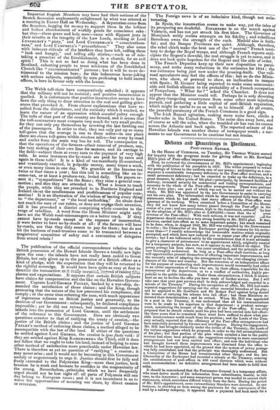The publication of the official correspondence relative to the British
possession of the Hawaii Islands throws-a totally new light upon the case : the islands have not really been ceded to Great Britain, but only given up to the possession of a British officer as a kind of pledge, with the expectation that they will be returned to the rightful sovereign. It would have been quite as easy at first to describe the transaction as it really accuacd,!:12tead ofraising alSe alarms and expectations. It appears that certain British subjects have claims for compensation and the like on the Hawaiian Govern- ment. Captain Lord Geonne Paur..ET, backed by a war-ship, de- .manded the satisfaction of those claims ; and the King, though protesting that the nature of the law prevented his compliance, did comply ; at the same time referring the case, with much appearance of ingenuous reliance on British Justice and generosity, to the decision of our Government : subsequently, he declared compliance impossible ; yet he did not retract, but instead surrendered the islands into the possession of Lord GEORGE, until the settlement of the reference to this Government. Here are obviously two questions anterior to that of ratifying the treaty of cession,—the justice of the British claims ; and the justice of Lord GEORGE PauLaT's method of enforcing those claims, a method alleged to be incompatible with the law of the land. If either of the questions be settled against Lord GEORGE, the cession is ipso facto void : if they are settled against King KAMEHAMEHA the Third, still it does not follow that we ought to take his land, instead of helping to some other method of satisfaction more practicable under Hawaiian law. There is therefore as yet no question of " ratifying " a cession; it may never arise; and it would not be becoming in this Government unduly or ungenerously to urge it. Justice should first be fully and freely extended to the Polynesian King—more than justice, both because he is weak and because he confides in the magnanimity of the strong. Nevertheless, sprinciples which we have frequently urged should not be lost sight of: all parts of Polynesia will one day belong to European races ; and it is not incumbent in us to waive fair opportunities of securing our share, by direct cession or reversion.


























 Previous page
Previous page